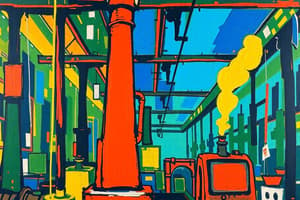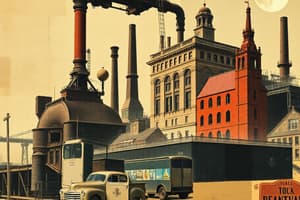Podcast
Questions and Answers
What problem did the producers of iron face in Britain?
What problem did the producers of iron face in Britain?
The producers of iron faced a problem of running out of forests and charcoal needed to make iron.
What did Abraham Darby I discover in 1709?
What did Abraham Darby I discover in 1709?
Abraham Darby I discovered a way of using coal to make iron by heating it to remove sulphur and making coke.
What did Abraham Darby III do to show the possibilities of iron?
What did Abraham Darby III do to show the possibilities of iron?
Abraham Darby III built a magnificent iron bridge to show the possibilities of iron.
What were the key factors that contributed to the changes in the way people lived and worked in the late 1700s?
What were the key factors that contributed to the changes in the way people lived and worked in the late 1700s?
What were some of the uses of coal during the late 1700s and 1800s?
What were some of the uses of coal during the late 1700s and 1800s?
How did the iron industry impact various aspects of life in the 1700s?
How did the iron industry impact various aspects of life in the 1700s?
What were some of the key provisions of the 1833 Factory Act?
What were some of the key provisions of the 1833 Factory Act?
What were the main changes brought about by the Mines Act of 1842?
What were the main changes brought about by the Mines Act of 1842?
What were the major provisions of the 1878 Factory and Workshops Act?
What were the major provisions of the 1878 Factory and Workshops Act?
Flashcards are hidden until you start studying
Study Notes
Iron Industry in Britain
- Producers of iron in Britain faced a problem of limited wood supply, which was necessary for smelting iron ore.
- Abraham Darby I discovered a method to smelt iron ore with coke (a type of coal) in 1709, which increased iron production and reduced costs.
Impact of Iron Industry
- Abraham Darby III demonstrated the possibilities of iron by building the Iron Bridge in 1779, showcasing its strength and durability.
- The iron industry contributed to changes in the way people lived and worked in the late 1700s by:
- Increasing productivity and efficiency
- Enabling the development of new machines and tools
- Facilitating the growth of transportation networks
- Leading to the growth of cities and urbanization
Uses of Coal
- During the late 1700s and 1800s, coal was used:
- As a fuel for smelting iron ore
- To power steam engines
- For domestic heating and cooking
Factory Acts and Reforms
- The 1833 Factory Act prohibited the employment of children under 9 years old in textile mills and limited the working hours of women and children.
- The Mines Act of 1842:
- Prohibited the employment of women and children in coal mines
- Improved ventilation and safety conditions in mines
- The 1878 Factory and Workshops Act:
- Extended the regulation of working hours to all industries
- Introduced stricter safety standards and regulations
- Strengthened the enforcement of labor laws
Studying That Suits You
Use AI to generate personalized quizzes and flashcards to suit your learning preferences.




